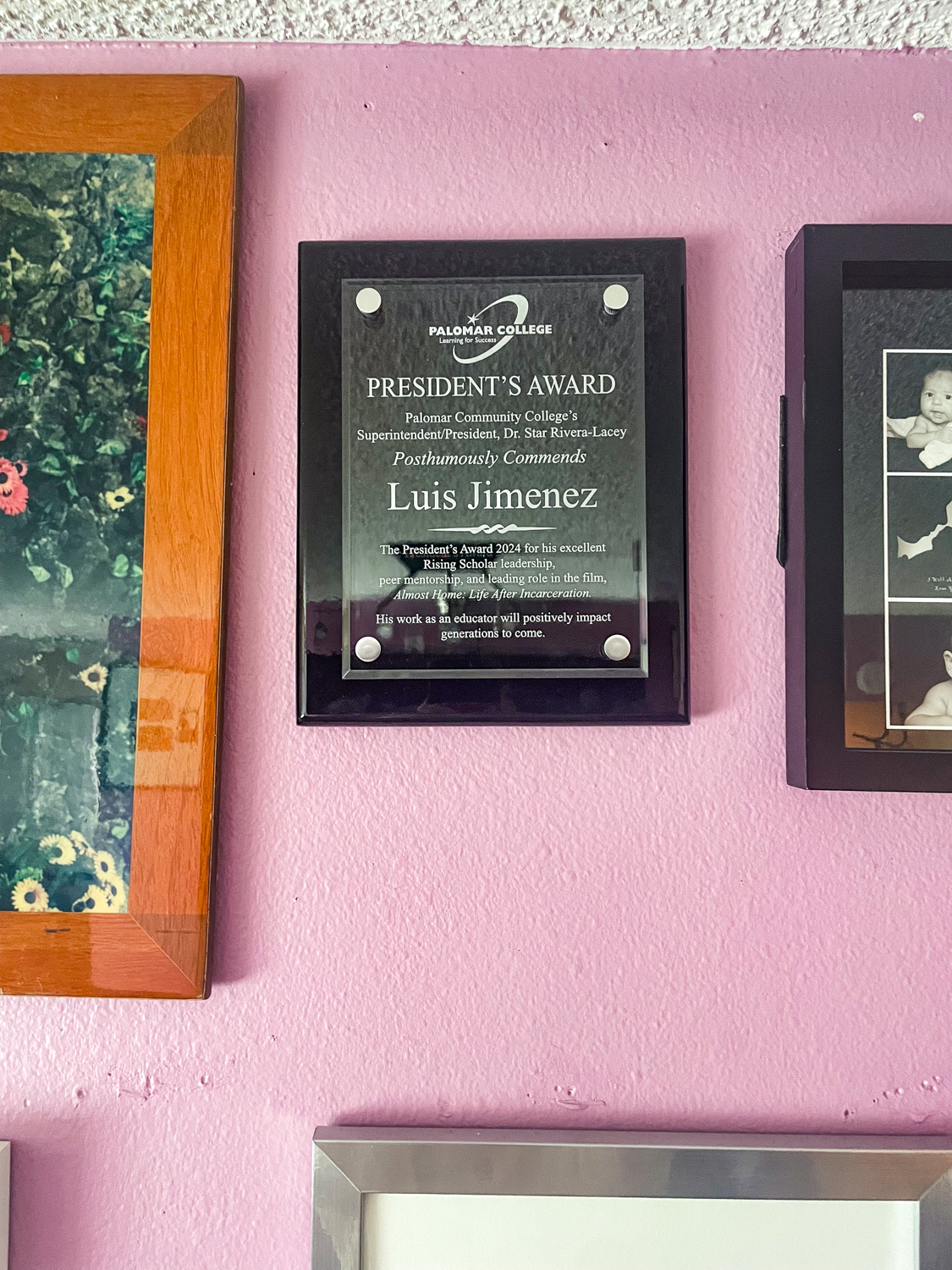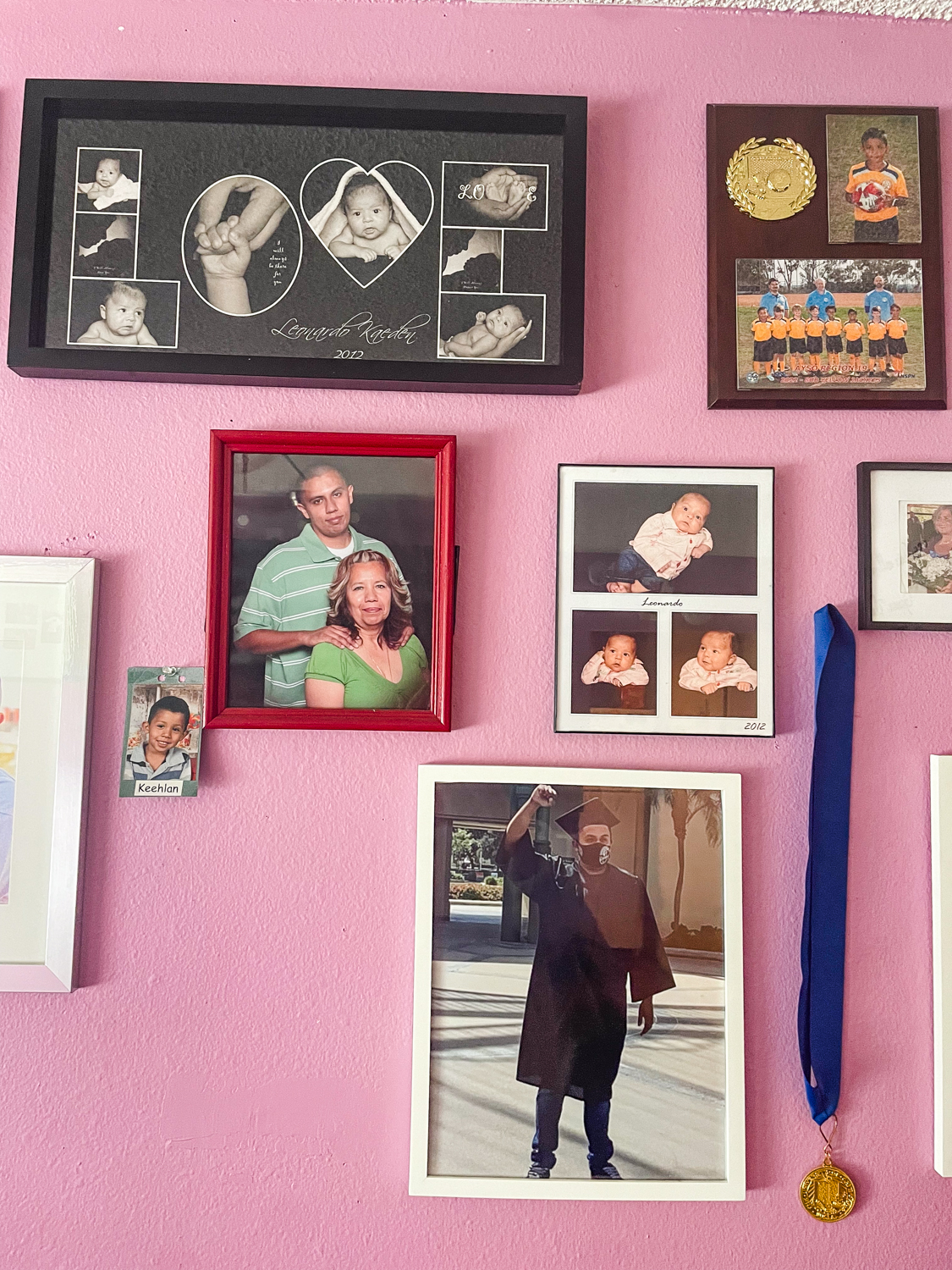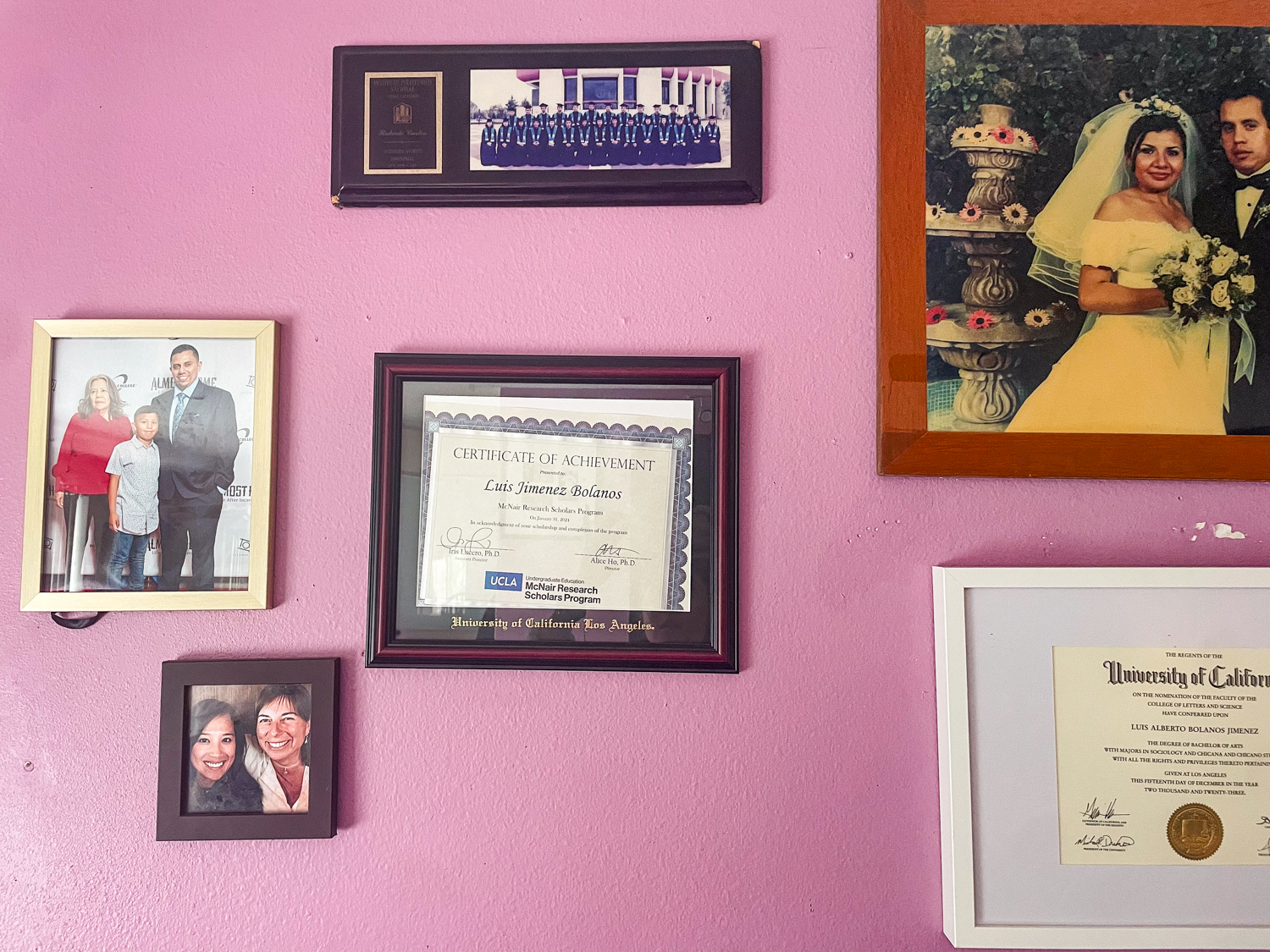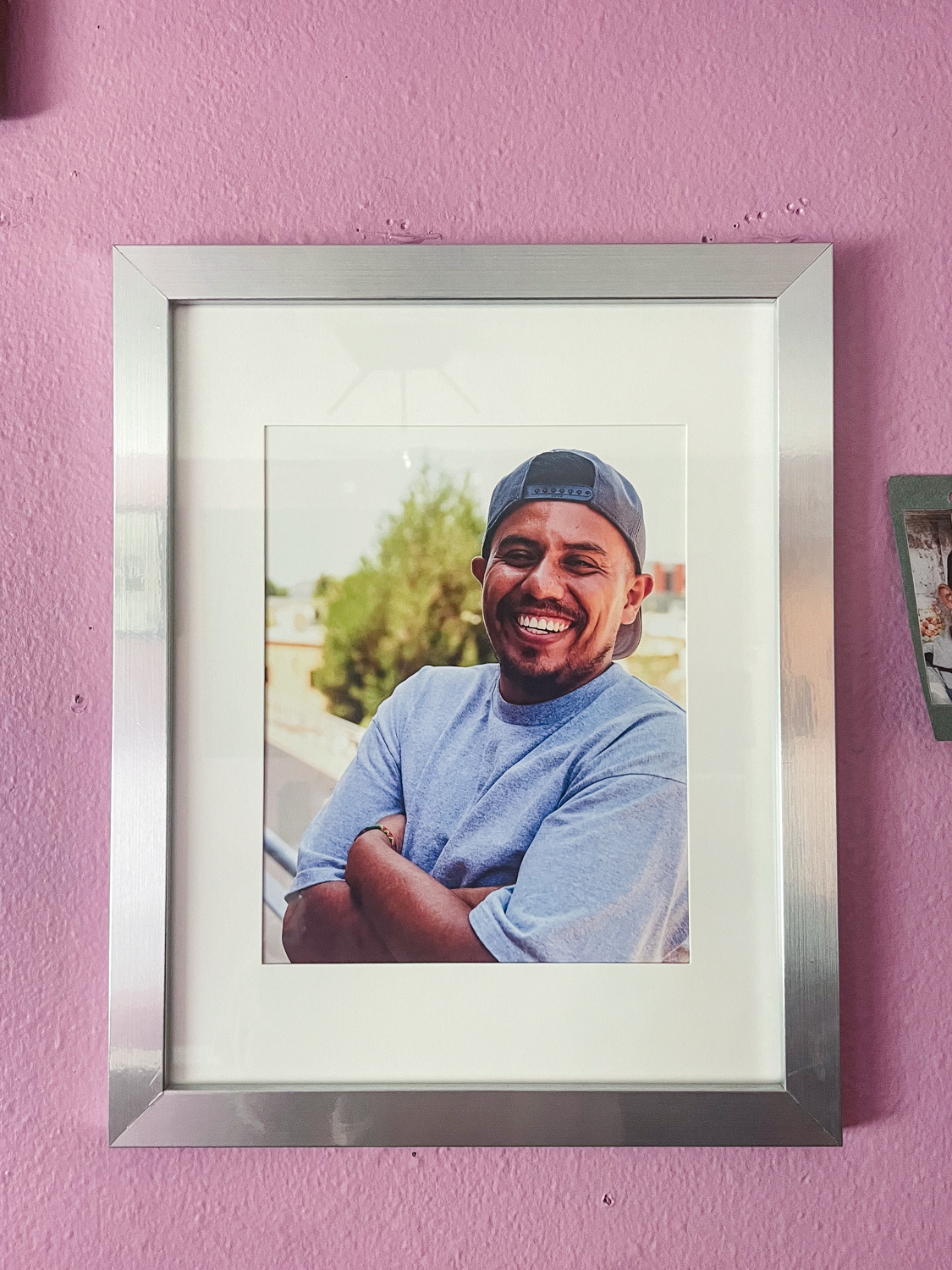Silvia Jimenez stands outside her home in Escondido, California, holding a photo of her son, Luis Jimenez. The 33-year-old Chicana and Chicano studies and sociology student was a McNair Research Scholar and a member of Bruin Underground Scholars who advocated for the needs of formerly incarcerated students at UCLA. He died by suicide in December 2023. (Courtesy of Dylan Tzung)
By Dylan Tzung, Isabella Sharp, Mridhula Thyagarajan
April 7, 2025 at 12:25 a.m.
Luis Jimenez was an exemplary son who sought unity between family and friends, helped with household chores and promised to spend his first paycheck taking his family out to eat.
From a young age, he was noble, friendly and always ready to lend a helping hand. His mother Silvia Jimenez recalls a time when he bought food and clothes for children who had nothing, spending all the money he had.
But at UCLA, the 33-year-old Chicana and Chicano studies and sociology student – who fought for an education after serving time in prison – felt isolated and abandoned by his university when he spoke out about the issues facing formerly incarcerated students at UCLA. He actively sought housing support, financial resources and mental health treatment, but he told those around him UCLA did not offer even the basics.
“It’s what brought him to death,” Silvia Jimenez said in an interview conducted in Spanish. “He asked for help, and they didn’t give it.”
Luis Jimenez dreamed of pursuing a master’s and doctorate in sociology after graduation and giving his two young children a love of education and providing children everywhere with better lives than he had, Silvia Jimenez said. Instead, the McNair Research Scholar died by suicide in December 2023.
“Supporting people was his passion,” said Nora Kenney-Whitley, the Rising Scholars coordinator at Palomar College. “He was a helper.”
UCLA provides resources for students impacted by the prison system through Bruin Underground Scholars, a program in the Bruin Resource Center, said Maritza Lopez, the program’s director. The program offers meal vouchers, emergency grants, access to a mini food pantry, connection with a tax services liaison and points of contact with resources such as the UCLA Career Center, Lopez said.
But the offerings do not adequately meet students’ needs, said Javier Rodriguez, a UCLA alumnus and one of the founders of the program.
The Bruin spoke with 33 students, experts, advocates and advisors and found that many students with prior convictions are, like Luis Jimenez, frustrated by the lack of support at UCLA. Compared to other more successful programs across the UC and the California Community Colleges system, UCLA’s program fails to build community or offer direct financial assistance, housing-specific support, collaboration with other campus resources, specialized mental health resources and counseling from those with experience in the justice system, students said.
Bruin Underground Scholars began as a campus organization in 2015, while the official funded program began in 2019, with the goal of building a prison-to-university pipeline for those impacted by the prison system.
The program receives funding from the Underground Scholars Initiative, a UC-wide program with $4 million in annual funding from California’s Budget Act of 2022, said UC Office of the President spokesperson Ryan King in an emailed statement.
Funding is split between UC campuses based on the number of students served, meaning each campus receives a different amount annually, said Gabe Rosales, co-founder of the UC Irvine Underground Scholars Program and a formerly incarcerated doctoral student in criminology, law and society. UC Davis’ program, for example, received $490,000 in 2023 to help serve its 64 students total – 23 formerly incarcerated and 41 system-impacted – whereas UC Riverside received $424,000 for its program, which works with approximately 60 students. UCLA’s program, which includes 80 registered students, receives about $500,000 annually.
But many students and staff remain dissatisfied with the allocation of that funding.
“The fact that the program is really failing miserably, it’s unfortunate,” Rodriguez said. “If we don’t feel welcomed in the space that currently exists and we can’t be vulnerable, we can’t share and really express what we’re going through on campus.”

Lack of community and student-led programming
Luis Jimenez was excited to join UCLA’s Underground Scholars program. He was a motivated and passionate member of Palomar College’s Rising Scholars program and looked to recreate that experience when he transferred to UCLA, Kenney-Whitley said.
Student leaders guided Palomar’s program, Kenney-Whitley added, and Luis Jimenez played a critical role in its success. She encouraged him to share his ideas, listened closely and found ways to implement them, she said.
Cynthia Murillo, a peer mentor with Palomar Rising Scholars, said she felt welcomed in the community at Palomar, which helped her feel more confident in college.
Shifting from such a strong community at Palomar to the more detached program at UCLA was extremely difficult for Luis Jimenez, Kenney-Whitley said.
Bruin Underground Scholars maintains an office in the Student Activities Center. However, Rodriguez said this space is not sufficient, which can make it difficult for students with prior justice system involvement to find the program and suggests that the program has limited importance to the campus as a whole.
Salvador Cruz, a formerly incarcerated student who transferred from Los Angeles City College, said the support system provided by Bruin Underground Scholars is helpful, adding that he has used tutoring, counselors, textbook support and meal vouchers. Still, the fourth-year American Indian studies and sociology student who interns with Bruin Underground Scholars said he wishes the program could do a better job at creating community and increasing student participation in determining what assistance they need.
Student input has helped create a strong program at UC San Diego, said Colleen Murphy, a former employee and student president of Triton Underground Scholars. Students advocated for bi-quarterly formal check-ins, which – alongside events such as community beach days and support from the UCSD administration – helped them foster strong relationships.

Financial assistance, housing support and integrated resources
Raul Armenta, a social researcher and UCR alumnus who was instrumental in founding the school’s Underground Scholars program, said a good support system should work with housing, mental health and family reunification, among other things.
Bruin Underground Scholars students, however, end up relying on fellow students for help when it comes to applying to student housing or obtaining accommodations, said Mynor Mendez, a fourth-year sociology transfer student in Bruin Underground Scholars.
In a November 2022 letter to former Chancellor Gene Block, Luis Jimenez, then the co-chair of Bruin Parenting Scholars, wrote that student parents at UCLA struggle to cover basic expenses including rent, food, utilities and transportation. He wrote that residents in family housing weigh buying hygiene products or transportation and argued that UCLA has a moral obligation to better support student parents.
Luis Jimenez was struggling financially himself, Kenney-Whitley said. She added that the high cost of living in LA – while being a full-time student, a McNair Scholar and the sole caregiver for his two children – took a toll.
“He really struggled with basic needs,” Kenney-Whitley said. “He was constantly hustling to figure out how to pay for himself and his two boys.”
In his letter to Block, Luis Jimenez wrote that the university should designate a mental health counselor for the Students with Dependents Program. He also suggested allocating more physical meeting space within the Bruin Resource Center for programs such as those for former foster youth and formerly incarcerated students in order to make them more visible.
“While the institution is not a placeholder for self-sufficiency, it has a moral obligation to acknowledge and welcome diverse populations to its campus,” Jimenez wrote in the letter.
Bruin Underground Scholars does not provide housing-specific financial assistance and offers only emergency scholarships, said Andrew James-McClure, the director of the Bruin Resource Center.
“That’s something that will take a toll on anyone’s mental health: trying to survive and keep your family and stuff somewhere safe,” said Lilly Angel, a UCLA alumnus who is currently serving as the Underground Scholars programming coordinator.
On the other hand, Ismael Davila, the former and first director of UCR’s Underground Scholars program, said the housing department there works closely with all students on campus who have prior justice system involvement and has successfully provided all those in need with on-campus accommodation. Riverside Underground Scholars also offers a $10,000 scholarship to incoming students in the program, Davila added, which can be applied to housing.
Murphy said her program works closely with the deans of each campus at UCSD, who encourage collaboration between Underground Scholars and other departments such as Housing and Financial Aid. That level of coordination is difficult to find at UCLA.
Davila said steering students with prior convictions toward accessible career pathways is also important because many employers do not hire people with prior convictions.
Davila said as a person with a criminal history himself, he enrolled in a teaching credential program after finishing his undergraduate degree and got a job as a coach and teacher – without realizing he would be fired as soon as the school found out about his record. At the time, Davila did not have access to counseling specific to formerly incarcerated students or a support network like Underground Scholars.
“If I would have had proper counseling from somebody that understands this, I would never have enrolled into a teaching credential program,” Davila said.
Davila uses his experience to speak with students who are graduating or have already graduated, discussing which career opportunities offer a viable path for college graduates with prior convictions.
Davila also began pursuing grants to supplement limited UCOP funding. The program received its first grant, $300,000 from the California Wellness Foundation, in November 2023. UCLA’s administrators have not sought similar outside funds, Lopez said in a written statement.
Rodriguez said he tried to offer his expertise to the Bruin Underground Scholars but found that its administrators were too conservative with the available funding.
Despite requests from members of the program, for example, Bruin Underground Scholars leaders refused to provide mental wellness programs, direct financial aid and more opportunities for dialogue.
Like UCR, UCLA’s program offers career support to help connect students to postgraduation employment opportunities, Lopez said in a written statement.
Having program staff who are formerly incarcerated is also vital for creating a welcoming program in which students feel represented and accepted, added Joe Louis Hernandez, the director of Rising Scholars at Mt. San Antonio College. Students are often afraid to share their experiences because of the stigma that comes with having been involved in the prison system, he added.
UCLA refused to disclose whether either of the two full-time Bruin Underground Scholars staff members identify as formerly incarcerated.

Mental health resources and informed counseling
Students in higher education with prior convictions also face negative stereotypes that are harmful to their mental, emotional and sometimes physical health, making programs like Bruin Underground Scholars and strong community ties particularly important, said Elif Yucel, a doctoral student at the University of Southern California Rossier School of Education studying college access for incarcerated and formerly incarcerated students.
Cruz, the UCLA student who transferred from LA City College after serving time in prison, said he felt out of place during his first few weeks at UCLA because other students seemed scared to speak to him.
He said he wishes the Bruin Underground Scholars administration would create more programs to promote mental wellness, but he has found that staff are generally unresponsive to student input.
In a July 2023 op-ed submitted to the Daily Bruin, Luis Jimenez also raised concerns about the Center for Accessible Education’s punitive response to drug addiction. He wrote that during his first appointment with CAE, he shared he was a student in recovery and was immediately asked if he were still using.
Luis Jimenez said he was not, but when the counselor specified that he would be ineligible to receive services if he was still using, he vowed never to reach out for help if he relapsed while at UCLA, according to the op-ed.
As a result, when he later relapsed in spring 2023, he considered dropping out despite being close to graduating.
Substance use disorders are a public health concern that are too often addressed with punitive responses, said Elizabeth Barnert, a UCLA associate professor of pediatrics who specializes in providing care to youth in the juvenile legal system. About 58% of state prisoners and 63% of sentenced jail inmates from 2007-2009 were found to meet the criteria for drug dependence and drug misuse in the United States Department of Justice’s National Inmate Surveys.
CAE Director Spencer Scruggs said in an emailed statement that students with substance use disorders can receive accommodations from CAE, contradicting what Jimenez wrote that the counselor told him.
However, Luis Jimenez wrote in the op-ed that he knew multiple students who were denied disability support by CAE because of their substance use.
Palomar’s program, on the other hand, helped Murillo, a recovering addict with learning disabilities, access support from the California Department of Rehabilitation. As a peer mentor, Murillo also encourages other Rising Scholars students to access the disability resource center on campus and behavioral health support because she recognizes that it can be embarrassing and overwhelming to independently seek out those resources.
Educating CAE counselors on the long-term challenges that students with prior convictions face, as well as the most beneficial types of resources, would go a long way in properly supporting students with prior justice system involvement, Mendez said.
Students would feel better supported at UCLA if behavioral health were more openly spoken about on campus or if there were more widespread awareness of resources available to formerly incarcerated and parenting students, Murillo said.
But counselors and staff at UCLA are generally not equipped to address the needs of nontraditional students, specifically those involved in the prison system, Angel said.
Angel, who transitioned from another supportive community college program to one with significantly more limited resources at UCLA, said she did not receive adequate support from UCLA Counseling and Psychological Services and was told it did not have the resources to assist her when she sought help. Additionally, only one therapist listed on the UCLA Student Behavioral Health Services website had specialized in trauma care, and that therapist left shortly after Angel first started seeing her.
“Sometimes I really do think right now that I would have been better off just not coming (to UCLA),” Angel said.

Moving forward
Fostering empathy is key when it comes to working with faculty, administrative staff and other students to better support the formerly incarcerated community, said Sandra Smith, a motivational speaker who researches the challenges faced by individuals who come to societal spaces such as higher education from the justice system.
But students with prior justice system involvement said both students and faculty at UCLA lack empathy for their unique experiences and challenges. Silvia Jimenez said her son was told he would always be a delinquent.
“I don’t know of any person that has returned from incarceration that has not had barriers and stigma attached if people know that that person has been incarcerated,” Smith said. “Advocacy is rooted in education – educating everybody, educating society, educating faculty, staff, other students that may not have been incarcerated.”
Kenney-Whitley said Luis Jimenez truly tried to advocate for himself and other formerly incarcerated students and convince the university administration to take students with prior justice system involvement seriously.
Jimenez’s mother said she wants justice for her son. She asks that UCLA support all students, especially those who are trying to turn their lives around. It is what Luis would have wanted, she said.
“He was a marvelous person,” Silvia Jimenez said. “I am very proud of him, of all of his achievements – everything he did.”
Contributing reports from Samantha Parr.
Translation of Silvia Jimenez interview by Leydi Cris Cobo Cordon.

